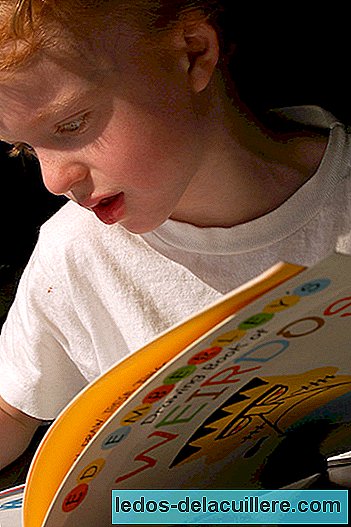
There are many studies that have been conducted on the language acquisition in children, as well as the ways we have to stimulate them, or the most frequent mistakes we make and that can delay their verbal development.
We knew that speaking to our children since they were born is very beneficial for them, but a recent study has just discovered that that conversation should be "bidirectional", since the greater the number of interactions, the better the child's language development.

A study carried out in 1995 suggested that children belonging to families with higher economic incomes and a higher socio-cultural level, hear about 30 million more words during their first three years of life, that children from low-income families. This would affect the acquisition of vocabulary, language development and reading comprehension.
But this theory has recently been dismantled by research conducted by the Massachusetts Institute of Technology (MIT), which has discovered that the child's brain development is more important than round trip dialogue and conversation with adults, that the fact of being exposed to a greater number of words.
"The new studies seem to suggest that the more parents get involved in a conversation with their child, the stronger the child's brain's response to language development will be" - said the professor of cognitive neuroscience, John Gabrieli.
How the study was carried out
This finding has put the finishing touch to an important work that has been developed in the last 20 years, and that has been funded, among other entities, by the National Institute of Child Health of the United States.
Research has focused on the study of verbal development of children between four and six years old of age, and a system called Language Environment Analysis (LENA) has been used, which has allowed scientists record each word spoken or heard by each of the children and then study your brain response using imaging tests.
Participating parents were asked to use a tape recorder every time they talked with their children, from morning until bedtime. These recordings were analyzed by a computer program that took into account three parameters:
- The number of words spoken by the child,
- The number of words heard by the child
- And the number of times the child and the adult maintained a round-trip word exchange, regardless of who started the conversation
The researchers associated greater language skills (vocabulary, grammar and verbal reasoning) to those children who had maintained a greater number of two-way conversations with adults, and not so much with those who had heard a greater number of words, as was then believed.
A reciprocal conversation with children gives them a greater opportunity to practice their communication skills, including the ability to understand what another person says and respond appropriately.Therefore, researchers urge parents to involve their children in conversations at a very young age, no matter how much we believe they will not understand us or consider it a waste of time.
"Obviously, a two-year-old is not going to discuss philosophy with you, but having a dialogue with him, whatever his verbal ability, is really valuable to him" - says Rachel Romeo, a Harvard graduate and lead author of the article.
"We have to talk to our children from the moment they are born, and probably even in the womb. But that language must be part of a relationship. It's not about transmitting words to a child throughout a whole day, if not to relate to him "
Can the screens replace the human relationship?
 Following this study, MIT researchers now ask themselves the following question: could artificial intelligence contribute to a child's brain development in a similar way to a conversation with adults?
Following this study, MIT researchers now ask themselves the following question: could artificial intelligence contribute to a child's brain development in a similar way to a conversation with adults?This is the great unknown that they hope to reveal with future studies, although some initial research has suggested that certain "smart" technologyLike computer programs capable of having a conversation, they could offer children additional benefits. However, other researchers are very skeptical of this idea and do not believe that technology can replace the human relationship.
In any case, and regardless of what they may show future studies related to the use of technology in this field, remember the importance of communicating with our children.
Let's talk to them and wait for their response: let's establish our particular dialogue while they are babies and only respond with babble, and as they grow we let them express themselves without cutting or speaking on their behalf.
IStock Photos
Via MIT News
In Babies and More Amazing Facts about the way we talk to babies, Maintaining eye contact with your baby facilitates communication between the two, Decalogue to stimulate baby's language












